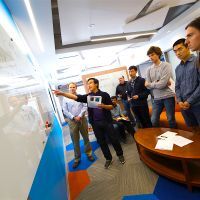Near-term applications of early quantum devices, such as quantum simulations, rely on accurate estimates of expectation values to become relevant. Decoherence and gate errors lead to wrong estimates. This problem was, at least in theory, remedied with the advent of quantum error correction. However, the overhead that is needed to implement a fully fault-tolerant gate set with current codes and current devices seems prohibitively large. In turn, steady progress is made in improving the quality of the quantum hardware. This leads to the question: what computational tasks could be accomplished with only limited, or no error correction? In this talk we first review two simple techniques for quantum error mitigation that increase the quality of short-depth quantum simulations. The first method, extrapolation to the zero noise limit, subsequently cancels powers of the noise perturbations by an application of Richardson’s deferred approach to the limit. The second method cancels errors by resampling randomized circuits according to a quasi-probability distribution. The two schemes are presented and we will discuss their application in recent experiments. Furthermore we will discuss recent progress on applying error mitigation techniques to logical qubits that don't support a universal gate set and show how to implement encoded Clifford+T circuits. Here the Clifford gates are protected from noise by error correction while errors introduced by noisy encoded T-gates are mitigated using the quasi-probability method. As a result, Clifford+T circuits with a number of T-gates inversely proportional to the physical noise rate can be implemented on small error-corrected devices without magic state distillation.
